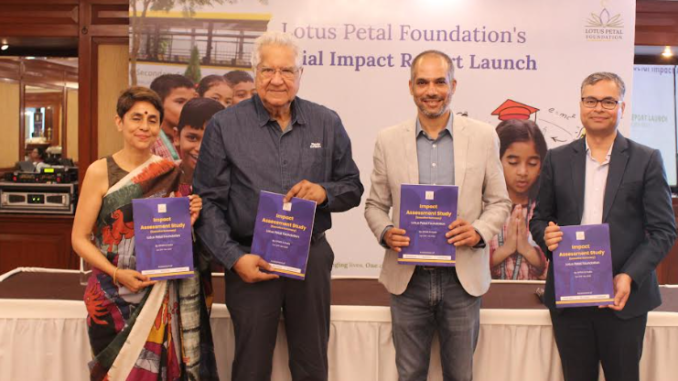New Delhi, April 2025 – Lotus Petal Foundation, a leading non-profit organization dedicated to providing access to quality education to underprivileged children, successfully launched its Social Impact Assessment Report, at an exclusive event at India Habitat Centre, New Delhi. The report, independently assessed by KPMG utilising two widely accepted evaluation frameworks- OCED-DAC Evaluation Criteria and Social Return on Investment (SRoI), highlights the foundation’s significant contributions towards bridging educational gapsshrey and bringing a sustainable change in the lives of thousands of students. The findings emphasized the importance of a well-structured program team, alignment with national and global policies and a focus of long-term sustainability as key strengths of the Foundations’ programs. The event was graced by over 30+ esteemed dignitaries, philanthropists, corporate leaders, and development sector experts, who have partnered with Lotus Petal Foundation in their journey towards educational transformation.

A key highlight of the event was the presence of Mr. Arjun Malhotra, Co-founder of HCL Technologies and a distinguished industry leader, who addressed the audience, emphasizing the role of education in driving social transformation.
In his opening remarks, Mr Kushal Raj Chakravorty, Founder of Lotus Petal Foundation, reflected on the foundation’s journey from a small initiative in 2013 with 6 students to an institution that today serves 2000+ students on a state-of-the-art 5-acre campus in Gurgaon.
“The independent assessment done by KPMG in India reaffirms the effectiveness of Lotus Petal Foundation’s approach and highlights the ripple effect of investing in education,” said Mr Kushal Raj Chakravorty, Founder of Lotus Petal Foundation.
Report Highlights
The Social Impact Report, compiled through interactions with over 600 stakeholders, presents key achievements of the foundation’s initiatives, including:
● Educating 2000+ students through high-quality, structured learning programs.
● Strengthening Digital Live Teaching Platforms to expand the reach of quality education to marginalized students across India.
● Creating an alumni network with students who are now pursuing higher education and securing dignified livelihoods.
● The SRoI analysis indicates a significant return on investment for the Foundation’s programs. For example, the SRoI for Education programs is 1:3.64, meaning for every rupee invested, ₹3.64 of social value is generated. The overall SRoI also indicates a substantial positive social return.
● The report also includes recommendations for enhancing the programs further, such as expanding extracurricular activities, introducing teacher training in partner schools.
With an ambitious vision for 2030, Lotus Petal Foundation aims to:
● Educate 10,000 students in their existing campus, making it one of India’s largest philanthropic schools for the underserved.
● Scale its Digital Live Teaching Platform to reach 1,00,000 students across India.
● Ensure 1000+ alumni earn at least thrice India’s per capita income, leading to long-term socio-economic mobility.
Panel Discussion
In the event, the Lotus Petal Foundation also organised an engaging panel discussion on the topic ‘Leveraging Impact through CSR & NPO Partnerships,’ where experts from Corporate Social Responsibility (CSR), philanthropy, and the development sector shared insights on collaborative approaches for maximizing impact.
The panel was led by our moderator – Professor S.Veena Iyer, Associate Professor in Accounting and Finance at MDI Gurgaon, and our panelists – Mr Gurpreet, Executive Director on the Rio Tinto Board, Mr Bijay Chowdhury, Group Head CSR & Philanthropy (Asia Pacific) at Synopsys Inc, Dr Sujeet Ranjan, CEO United Way of Delhi.
The discussion was centered on understanding the CSR funding landscape in India, impact assessment reports, talent acquisition and required skills of people in the social development sector. Emphasis was also laid on how academia can be leveraged in empowering the students with appropriate skill set required for the social development sector.